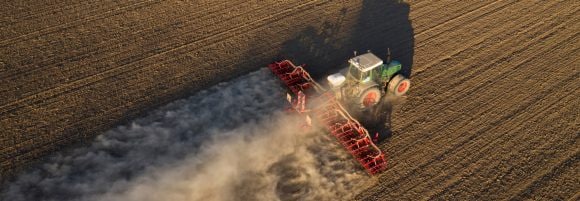
Download translations
Download translations
What role is agriculture playing in Swiss decarbonization efforts?
Switzerland’s small size and strong tradition of agriculture make it an ideal place to prototype low-carbon farming practices. While Switzerland itself has a limited global impact, the innovations tested here, from precision application technologies to AI, are now being deployed globally to reduce inputs, improve soil management, and ultimately reduce greenhouse gas emissions.
What are the key strategies or technologies for decarbonizing agriculture in Switzerland?
A key strategy to continue its decarbonization is reducing pesticide and fertilizer use through precision technology. Ecorobotix’s technology, for example, reduces pesticide use by up to 90%, offering a significant decarbonization opportunity by minimizing the reliance on oil-based chemicals that require lots of energy to produce, and contribute to climate warming when they are broad-sprayed into the air. Natural interventions, like maintaining wildflower meadows in sections of fields, also helps by keeping soils healthy and absorbing carbon dioxide.
What are the main challenges for decarbonizing Swiss agriculture?
As long as chemicals remain cheap, high-precision robotics can be hard to justify economically. Ecorobotix’s technology is more precise but slower than conventional broad spraying and may not be cost-competitive in all contexts, particularly where cheap chemicals dominate. The key challenge lies in developing regulations that balance environmental and economic incentives. But AI-powered precision farming will scale like the EV market; once the tech is cost-competitive, it will rapidly scale.
How does Ecorobotix’s technology facilitate more sustainable farming?
Our technology leverages AI to guide farmers in making complex decisions about crop care, considering factors like weather, humidity, and soil composition. The high-precision application of chemicals reduces the use of herbicides and pesticides, thus reducing carbon emissions. We frame it as the «3 Rs» strategy – Reduce, Replace, Regenerate. First, chemicals are reduced, then replaced with organic alternatives like vinegar or natural acids, and finally, biodiversity is regenerated by only spraying selectively where needed.
Looking ahead, what policies are critical for decarbonizing Swiss agriculture?
In broader agriculture, particularly with large-acre farms where cheap chemicals remain the norm, support from authorities will be essential in pushing the transition toward more sustainable, precision farming practices. Incentives are needed to make these transitions cost-neutral or positive for farmers.
How do you see the interplay between energy security, decarbonization, and food security?
Improved agricultural efficiency reduces reliance on foreign chemical inputs and, at the same time, improves local production volumes. Precision farming technologies, like those developed by Ecorobotix, allow farmers to grow more with the same amount of land and bring production closer to urban areas, where broad spraying of harmful chemicals is not allowed.

